Exhibition on WWII Concentration Camp on Pag Island to Be Staged in Split
ZAGREB, 2 Feb 2022 - The exhibition about Slana on the island of Pag, the venue of the first concentration camp in the Independent State of Croatia (NDH) which operated between June to August 1941, will be opened in the Salon Galić gallery in Split on Thursday.
The authors of the exhibition titled "Slana – Radikalni krajobraz" ("Slana – the Radical Landscape”), are Davor Konjikušić, Nika Petković and Goran Andlar.
The project was launched in 2016 to conduct interdisciplinary research, while findings from this research served as the basis for the 3D rendering of the camp. The Slana concentration camp was located in the central part of the island of Pag, in a deep bay overlooking Mount Velebit. According to some sources, an estimated 8,000 people were held under inhumane conditions in the open bay during the summer of 1941
The project by Konjikušić, Petković and Andlar has been supported by the Serb National Council (SNV), while the exhibition has been organized with the assistance of Croatia's office for human rights and ethnic minorities' rights.
The exhibition runs from 3-21 February.
For more, check out our dedicated lifestyle section.
PM Andrej Plenković: Government is Sponsor of Antifascism Anniversary
ZAGREB, 22 June, 2021 - Prime Minister Andrej Plenković said at the Antifascist Struggle Day commemoration on Tuesday that this year the government was organising the observation of that public holiday and that it would be the same in the future, noting that the turbulent time of war should be viewed in all its complexity.
"I am pleased to greet you on behalf of the government on the occasion of Antifascist Struggle Day here in Brezovica forest," said Prime Minister Plenković in his speech at the central Antifascist Stuggle Day commemoration at Brezovica Memorial Park near Sisak, adding that the holiday was established in 1991 at the initiative of then president Franjo Tuđman.
The prime minister recalled that at the beginning of summer 1914 Hitler's Germany had taken control of most of Europe and had begun its senseless and criminal policy in which about six million European Jews had been killed and that after the occupation of Yugoslavia, "the Quisling NDH regime" had been established in Croatia.
Croatia had largest resistance movement in Europe relative to its population
"In reality Croatia was divided into German and Italian occupation zones, while most of Dalmatia, Gorski Kotar and Primorje were annexed to Italy after NDH authorities ceded them to fascist Italy, and racial laws were passed against Jews, Roma and Serbs," Plenković said.
He pointed out that 80 years ago about 70 fighters, mostly Croatian, had established the first Sisak Partisan resistance movement in Brezovica forest.
"Among them was a young Janko Bobetko, who would become a Croatian Army General and Chief of Staff of the Armed Forces in the 1990s," the prime minister said.
He added that the Partisan movement in Croatia had 7,000 members, including many Croatian Serbs.
Plenković underscored that Croatia had had the largest resistance movement in Europe relative to its population.
"Last year we marked the 25th anniversary of the great victory in Operation Storm and the Homeland War, and then I said that we also mourned the victims of crimes committed by Croatia, which unfortunately happened, because a legitimate right to defence is not an excuse for crimes," the prime minister said.
Totalitarian regime in Yugoslavia betrayed antifascists
He added that regardless of the merits of Croatian Partisans, that turbulent time should be viewed in all its complexity.
Plenković said he was thinking primarily of the post-war crimes of the JNA (Yugoslav People's Army) near Bleiburg, Austria and the mass executions of disarmed soldiers and civilians along marches back to Yugoslavia, which he said was traumatic for many families, and which deepened the disastrous divisions in post-war Croatia.
He also underscored that the totalitarian regime in Yugoslavia had betrayed antifascists.
Here I'm thinking of post-war purges of political dissidents, such as the persecution of the Blessed Cardinal (Alojzije) Stepinac, who in his sermons publicly opposed the persecution of Serbs and Jews, and saved many of them from death, Plenković said.
Close divisions still present in society
Plenković said that the time had come for us Croatia a society to take a more sober view of the events of that time and to better evaluate the contribution of the Croatian antifascist resistance to Nazism.
"Only in that way will we close the divisions still present in our society and build the unity necessary to face the challenges ahead of us. Today we finally have a free democratic Croatia, a member of the EU and NATO, whose foundations are in the democratically expressed will of citizens and the victory of the defenders in the Homeland War, which also implies the value of antifascism," Plenković stressed.
He said that after the pandemic and last year's earthquakes, and in the context of increasingly rapid climate change, which would be by far the greatest challenge for the world in the future, Croatia needed unity and to look to the future more than ever.
"Therefore, it is up to all of us to rise to the task that awaits us," Plenković said.
For more about politics in Croatia, follow TCN's dedicated page.
President Zoran Milanović Says Croatia Was on the Side of Good in WWII
ZAGREB, 22 June, 2021 - President Zoran Milanović said on Tuesday, speaking on Antifascist Struggle Day, that "the truth is a deep water," that it could hurt, but that there was nothing painful in Croatia's truth and that in WWII Croatia was not just on the side of the winners but on the side of good, too.
"The truth is a deep water and shouldn't offend anyone, but it can hurt. However, in this truth of ours there is nothing painful, it is actually beautiful. Difficult, bloody, but beautiful," Milanović said in his address at the central Antifascist Struggle Day commemoration in Brezovica Memorial Park near Sisak.
The commemoration was organised by the government and was attended by Prime Minister Andrej Plenković for the first time. This was the first time he and Milanović attended an event together after months of conflict over the selection of a new Supreme Court president.
We are doing Sisak Partisans no favor if we constantly underline they were Croats
Talking about the establishment of the First Sisak Partisan detachment 80 years ago today, Milanović said it was formed by "77 Sisak communists, revolution fighters, fighters for a better order and change."
He said "we are not doing a favour" to those people by constantly underlining that they were Croats and that that was a Croatian struggle. "Yes... they were all Croats. However, they were first and foremost communists fighting for revolution, for a Soviet Croatia, not democracy."
"Those were heroes, heroes of calibre, but other people as well, adventurers who often crossed the line and committed an injustice. All that is our history, our truth. It doesn't offend, it shouldn't be better."
Croatia was on the side of the truth and good
Milanović said he did not come to Brezovica to "force my truth on anyone" but to point to things that put Croatia where it belonged.
"Croatia wasn't just on the side of the winners, Croatia was on the side of the truth and good, the majority of the Croatian people and Croatian Serbs. To point out all the time that they were winners and not losers is a risky look on life and destiny. It means that we could have lost had the Axis, for example, won the war. Would that have made our resistance any less worthy?"
Croatia was also on the side of risk, danger and courage, therefore Croatia, just as Slovenia, Bosnia and Herzegovina, Serbia, and Montenegro, has a deep reason to celebrate Antifascist Struggle Day, Milanović said.
The Sisak detachment was not the first one formed in Europe, but there was a symbiosis of the antifascist struggle that took place in Žabno and then in Sisak a month later, on 22 July 1941, when Ustasha forces surrounded the Partisans, he said.
Uprising with Serb brothers and sisters to preserve humanity
After that, the fighters went to the Banija region "to rise up to arms, together with our Serb brothers and sisters, to preserve humanity."
"Communist agitation on the one hand while on the other, because at that time the Croatian people wasn't ready for an uprising, the Serb people in Croatia, our brothers in arms in that war. Together with Croatian officers, they carried that people's uprising. It happened in Kordun and Banija."
Speaking of the role of Croats in WWII, Milanović said that joining the antifascist struggle was "an act of incredible bravery" for them because they lived in relative comfort in comparison with Serbs and Jews, who were persecuted and killed in the Nazi-styled 1941-45 Independent State of Croatia.
He said there were still people in Croatia, not just a few, who did not approve of celebrating Antifascist Struggle Day, "but that's how it is in a political system." He also underlined the fact that the whole state leadership was at today's commemoration.
For more about politics in Croatia, follow TCN's dedicated page
Milorad Pupovac: Ban on Ustasha Insignia is Civilisational Issue For All Political Actors
ZAGREB, 22 June, 2021 - Independent Democratic Serb Party (SDSS) president Milorad Pupovac said on Tuesday that adopting amendments to the Criminal Code to ban Ustasha insignia and the salute "For the homeland ready" was a civilisational issue for all political actors in Croatia.
Adopting amendments to the Criminal Code is a civilisational issue for all political actors in Croatia do that it can get rid of the legacy of World War II, especially the consequences of the Ustasha rule from 1941 to 1945," Pupovac said ahead of Antifascist Struggle Day commemoration in Brezovica.
Asked whether adopting the amendments to the Criminal Code would be a condition for the SDSS to support the government, Pupovac said that no one should set any conditions about that.
"We can only discuss how to do it," he said.
He said that the president of the Zagreb Jewish Community Ognjen Kraus convened a new meeting for Friday to discuss further steps towards resolving the issue of the Ustasha salute "For the homeland ready", adding that the final version of the bill of amendments to the Criminal Code was being prepared.
Pupovac welcomed the fact that the government was the organiser of this year's central Antifascist Struggle Day commemoration in Brezovica, stressing that this was very significant.
For more about politics in Croatia, follow TCN's dedicated page.
Friends of Croatia: UNICEF - Croatia an Example to the World When it Comes to Breastfeeding
May 27, 2021 - The sixth article in the "Friends of Croatia: UNICEF" series explores the work of the UNICEF Office for Croatia. What is done regarding children's rights in Croatia, positives, and negatives, and how can you help if you want to?
To ensure that our world even stays the same, let alone improves, new generations are essential. But, before they grow old enough to participate in society, society must first take care of the youngest ones to grow and develop. Society must ensure for kids that they grow up in families filled with love, make sure that kids can go to school, that they are healthy, safe from violence, that they are not hungry or thirsty, and give them overall opportunity to make it in the world.
Basically, children have rights, and they are in more detail elaborated in 54 articles. For more details, have a look at the Convention on the Rights of the Child that came to power on September 2, 1990, by the United Nations (UN) General Assembly.
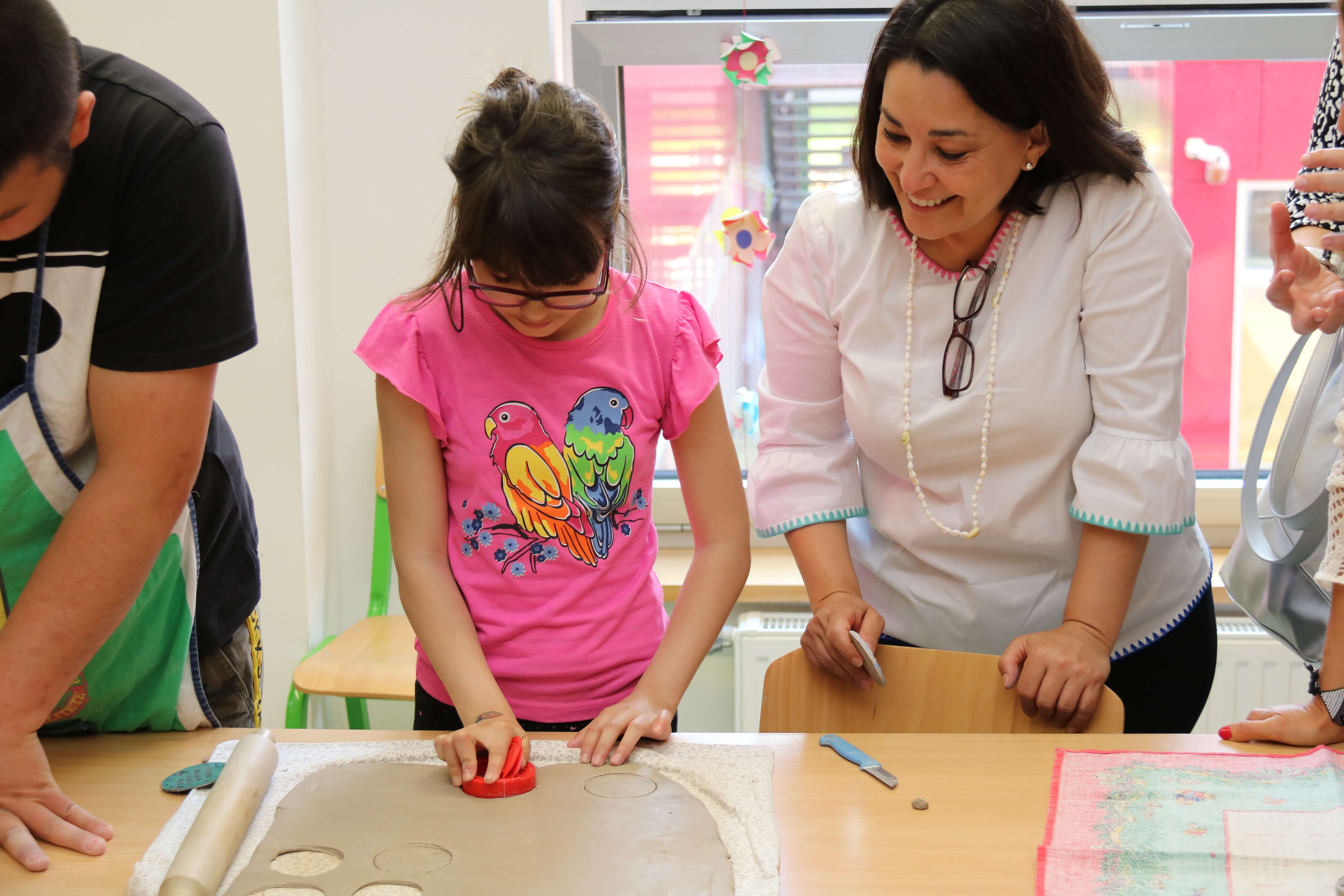
Regina M. Castillo, UNICEF office for Croatia representative with children with disabilities in Centre Tomislav Špoljar in Varaždin © Marin Ilej/UNICEF
The UN is dedicated to seeing this Convention is being respected, and United Nations International Children's Emergency Fund, commonly known as UNICEF, specializes in the issues of children's rights. Established in the aftermath of World War II, UNICEF has been at the frontlines of humanitarian crises, armed conflict, and natural disasters.
„Undeterred by the scale of the crises, we rise to the challenge, reimagine what is possible and respond by helping millions of children survive and thrive. Our on-the-ground expertise has reached more than 191 countries and territories, through committed partnerships and a passion for innovation“, says UNICEF on its official website.
Croatia signed and agreed with the Convention, and UNICEF today has its own office in Zagreb. Furthermore, it's worth noting that UNICEF has existed for 75 years, and despite firstly coming to Croatian territory while the country was part of the former Socialist Federal Republic of Yugoslavia, UNICEF has been with Croatia since the organization was established.
„Many people do not know that UNICEF helped to eradicate malaria in Croatia and that UNICEF played a key role in the development of modern dairy. Dairies were built in Zagreb, Rijeka, and Split, and factories for the production of powder milk in Osijek and Županja. Milk was distributed in schools, and for many children, it was their only meal during the day“, says Regina M. Castillo, UNICEF Office for Croatia representative.

Regina M. Castillo, UNICEF office for Croatia representative © Marin Ilej/UNICEF
The UNICEF representative is elected for a five-year mandate, and Regina M. Castillo came to her function in Croatia in 2019. Her career in the UN started in 2001 and was in charge of economic and social questions in the Executive Office of the UN chief secretary Kofi Annan in New York. This was followed by Castilla moving to work in the mutual program for HIV/AIDS, known as UNAIDS. She was first the director of private sector partnerships in Geneva (2006-2012) and then moved to be the director for Bolivia, Ecuador, and Peru (2012-2015). She majored in International relations and public politics.
Born in Nicaragua, she first started her career in the 1990s as a diplomat, and she was also the headmistress for international trade in the Nicaraguan Trading Ministry.
Helping Croatia before it was cool (or an independent country)
Castillo went on to continue that after World War 2, UNICEF fed six million children every day, which included many children in Croatia.
„One of those children was our dear colleague, prof. Josip Grgurić, who is still working tirelessly for the youngest. He still remembers the yellow cheese that was part of UNICEF's humanitarian package for families, as well as the chocolate that he then tasted for the first time. He later worked at the children's hospital in Klaićeva, which UNICEF helped found, and he still works hard on UNICEF’s Child-Friendly Hospital Initiative“, says Castillo indicating how valuable but also inspiring UNICEF can be to children. Castillo added that in the Homeland War, UNICEF was the first organization on the ground, making sure that children and families received the necessary psychosocial support and humanitarian packages. After the war, they educated children on how to protect themselves from landmines.
Today Croatia developed, joined NATO and EU, and is a modern European country. With such progress, there have been many improvements in respect to children and their rights.
„Croatia has a low mortality rate of children under the age of five, extremely low stunted growth rate due to inadequate nutrition in the first years of life and the enrolment rate of children in primary school is almost 100 per cent“, pointed out Castillo.
„Croatia is an example in the world when it comes to the promotion of breastfeeding. It is rare that all public maternity wards in a country have the status of 'Child-Friendly Hospital'. With the support of UNICEF, partners have organized a network of breastfeeding support groups, and now we have more than 200 support groups in Croatia“, added Castillo on what the world can look up to this small South-Eastern European country.
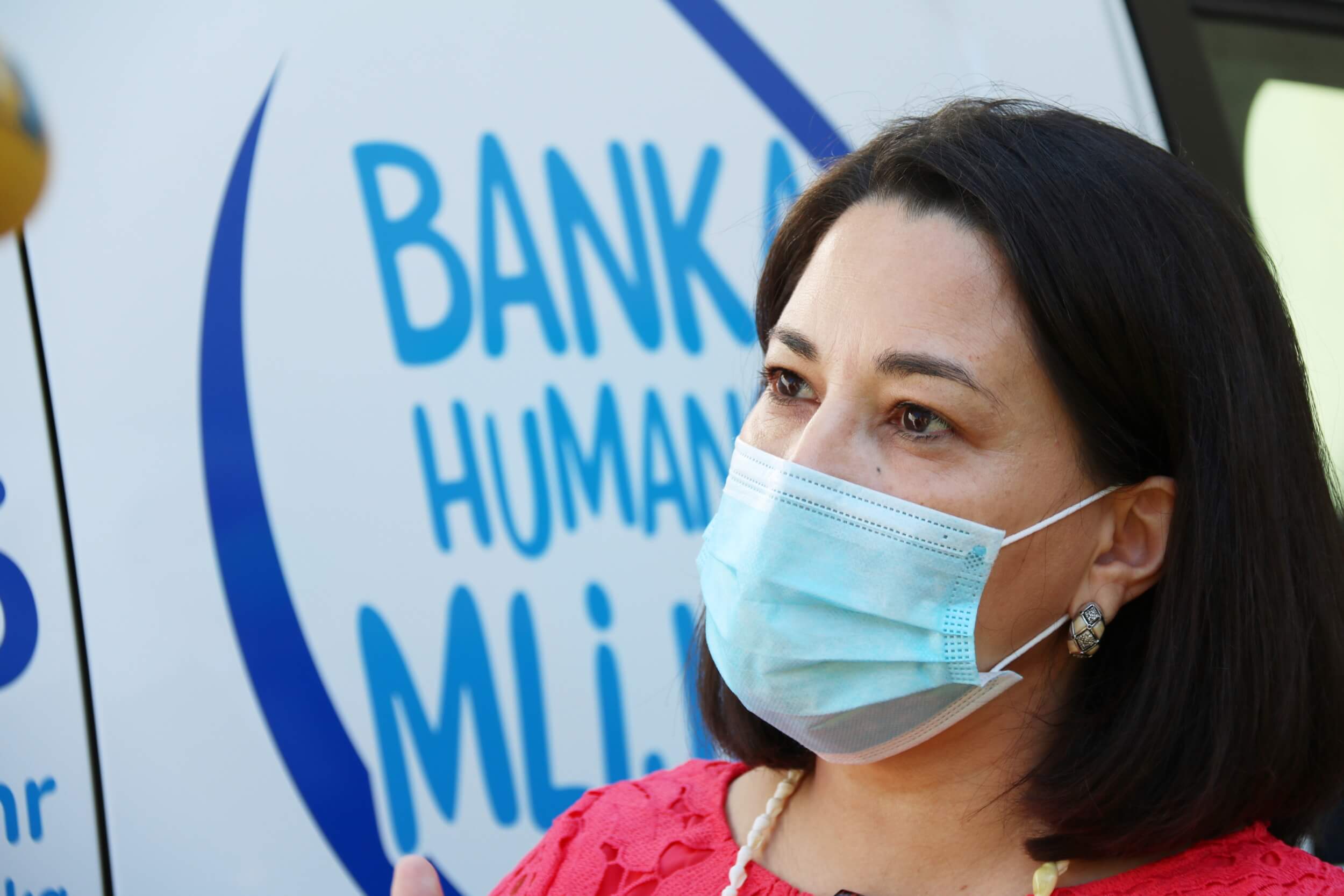
Regina M. Castillo at Human milk bank © Marin Ilej/UNICEF
Still, there are some issues Croatia needs to address and are far from ideal at the moment.
„There are still differences when it comes to access to services for children, depending on where they live and the conditions in which they grow up. Children with disabilities, as well as children from the poorest families, especially in rural areas, often do not have the opportunity to attend kindergarten and do not have the same access to specialized health services and therapies as children in urban areas. The focus of UNICEF in Croatia is on the most marginalized children: children with disabilities or developmental delays, children growing up without adequate parental care, children from minority groups, children at the risk of poverty and exclusion. UNICEF’s programs are focused on the well-being and protection of every child, with a special focus on the most vulnerable children“, pointed out Castillo.
Campaigns and programmes such as “Every child needs a family”, “The first three are the most important”, and “Stop violence among children” are perhaps the most known public action by UNICEF in Croatia, but returning to the good practices of breastfeeding, Castillo emphasizes the establishment of the Human Milk Bank in her current mandate.
„Thanks to the Human Milk Bank, prematurely born and seriously ill newborns (who do not have access to their own mother's milk) can receive milk donated by other mothers. We continually work on reducing the risk of disasters, support the development of quality foster care and provide support to parents in the upbringing and care of children through workshops and we work a lot with young people“, said Castillo.
In general, UNICEF has different types of offices in countries, and regarding the Croatian office, it’s a Country Office. In other words, most of the resources (human and financial) are invested in programs in Croatia. Castillo says that the five-year mandates have priorities that are determined in cooperation with partners. And while 80 percent of the funds raised are invested in programs for girls and boys in Croatia, there are funds and support programs for children outside of the country.
“For example, in 2018, UNICEF supported child health care in parts of Ukraine affected by the conflict and helped the building of five inclusive children's playgrounds in two refugee camps in Jordan in cooperation with the Ministry of Foreign and European Affairs in 2019. Through the ‘Schools for Africa’ program , which includes many kindergartens and schools throughout Croatia, UNICEF supports the education of girls and boys in Madagascar", Castillo listed several examples.

Regina M. Castillo, UNICEF office for Croatia representative with children on Media Literacy days press conference with Radovan Fuchs Minister of Science and Education, Krešimir Partl, State Secretary at Ministry of culture and media and Robert Tomljenović, Deputy Director of the Council for Electronic Media © Marin Ilej/UNICEF
Overall, the UNICEF Office for Croatia works closely with the Croatian Government, and most notably, with the Ministries of Social Welfare, Education, Health, and the Ministry of Foreign and European Affairs. Other partners also include experts (Croatian experts, but also building on expertise and good practice from all over the world), professional associations, academia, services providers, and NGOs.
“UNICEF’s goal is to connect all stakeholders and to advocate and support systemic change for the well-being of all children. System change is a gradual process, and it can be challenging, but when it comes to children’s rights, every step forward is well worth the effort”, explained Castillo.
Croatian citizens showing support for UNICEF
On one hand, Croatia is a good country with low mortality rates of kids and a role model for breastfeeding promotions. On the other hand, however, peer to peer violence (on whose suppression the aforementioned “Stop violence among children“ campaign works heavily on), and unequal approach to education between rural and urban areas show Croatia has both its ups and downs. Unfortunately. The downside sometimes overshadows all the positive things.
One such instance was the tragic death of a two-year-old girl from Nova Gradiška on Easter Sunday. The death of a severely injured girl, who was brought to Zagreb's children's hospital after suffering abuse and heavy beating from her biological parents (and from whom the girl was taken and given to a foster family but was then returned back to biological parents), sparked controversy and citizens outrage, culminating in changes in social welfare law, as well as sacks and investigations in the welfare center in Nova Gradiška.
„We are deeply saddened by the tragic death of two-and-a-half-year-old Nikoll on Easter Sunday. There are no words to express the pain of such a terrible event. Unfortunately, there are no simple and quick solutions to prevent violence against children. For years, UNICEF in Croatia has been continuously and persistently working in the field of child protection, educating experts from the social welfare system, but also other experts who work with children and families, such as experts from the health care, education, and justice systems. UNICEF implements various support programs for parents, and it is fully committed to the development of foster care and the improvement of the legislative framework. However, UNICEF is also aware that society as a whole, has a long way to go to achieve the goal that every girl and every boy is guaranteed the best possible care and protection. UNICEF will continue to work actively, persistently, and dedicatedly with all partners to achieve it”, commented Castillo.
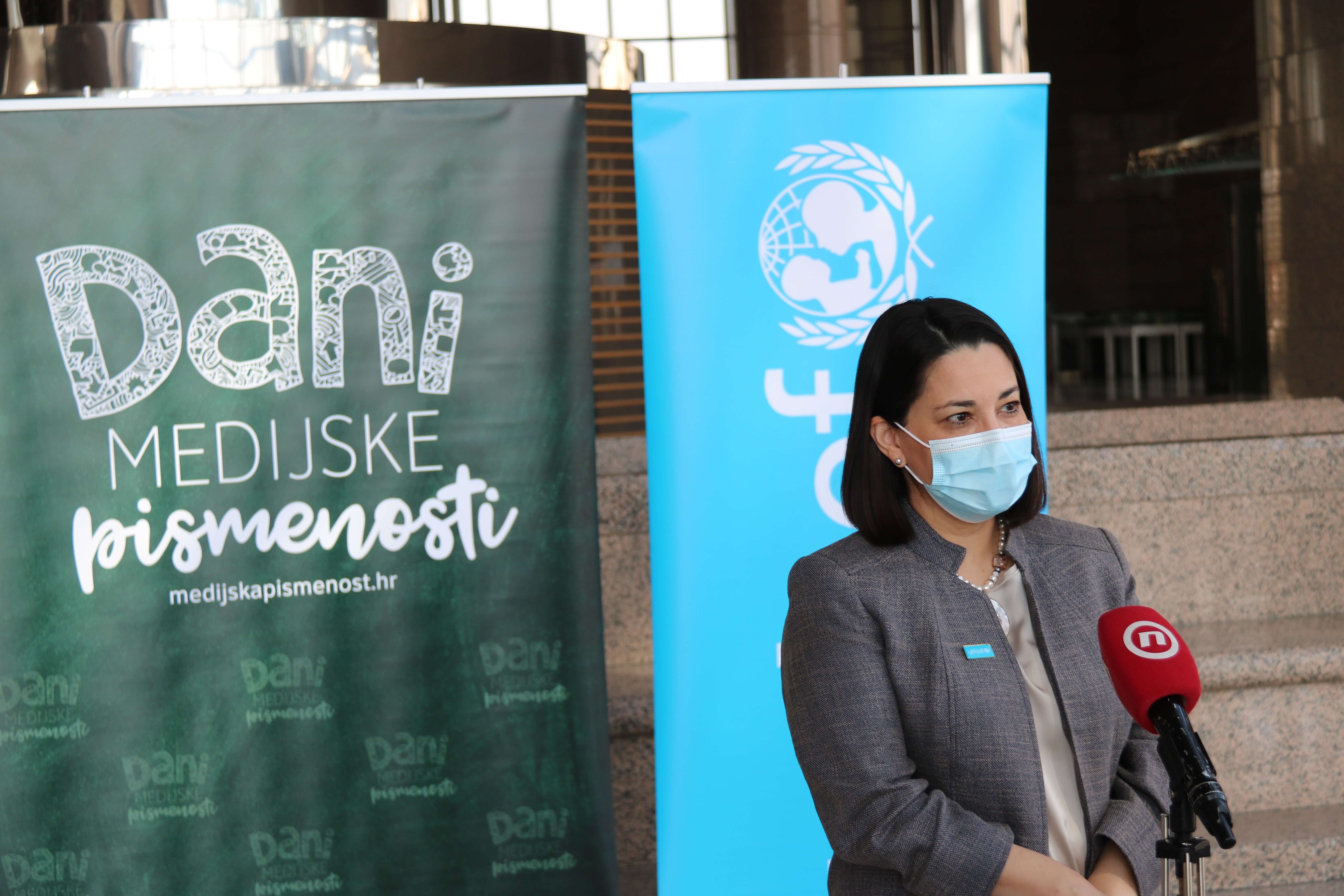
Regina M. Castillo talking on Media Literacy days press conference © Marin Ilej/UNICEF
However, Croatians recognize the importance of the UNICEF mission. Before Covid, UNICEF annually collaborated with the Museum of Illusions on the Museum of Reality exhibition which displayed the problems children faced worldwide, but which also showed what changes and solutions UNICEF brought to those areas.
“Experience tells us that citizens are ready to support the youngest, in Croatia and beyond. Implementation of our programs would not be possible without the support from citizens and companies that placed the focus of their CSR activities precisely on children. We especially value the support from our Childhood Guardians, donors who support our work with regular monthly donations and allow us to regularly conduct our programs for boys and girls, as well as react quickly with much-needed assistance in crisis situations like the earthquakes in Croatia and the COVID-19 pandemic that affected all families. UNICEF is always in the field with the most vulnerable children and their families”, notes Castillo.
In the end is important to note, that while children are recognised as a particularly vulnerable group, all human rights apply equally to children.
“All the rights enshrined in the Convention apply to every child, regardless of a child’s country of origin, gender, religion, and nationality. Every child, by birth, has all his/her rights, the right to grow up in a safe environment, to have a family, to have access to health care and education, to be able to play and develop his/her interests and reach his/her full potential”, concludes Castillo.
The five-year mandate is an agreement that sets priorities in advance, so Castillo warned that there is no opportunity for making donations outside of that framework. UNICEF office occasionally does get messages from citizens who need advice or help on issues outside of that frame, but nevertheless, UNICEF can offer them help by referring them to institutions and addresses that can offer citizens the necessary support, financial support, or information.
With expertise mentioned several times throughout this story as the insurance of delivering the best solutions to issues children face, UNICEF is always on the lookout for new people. If you want to make a change in the world while earning a fair wage yourself, check out what expertise UNICEF is looking for right now.
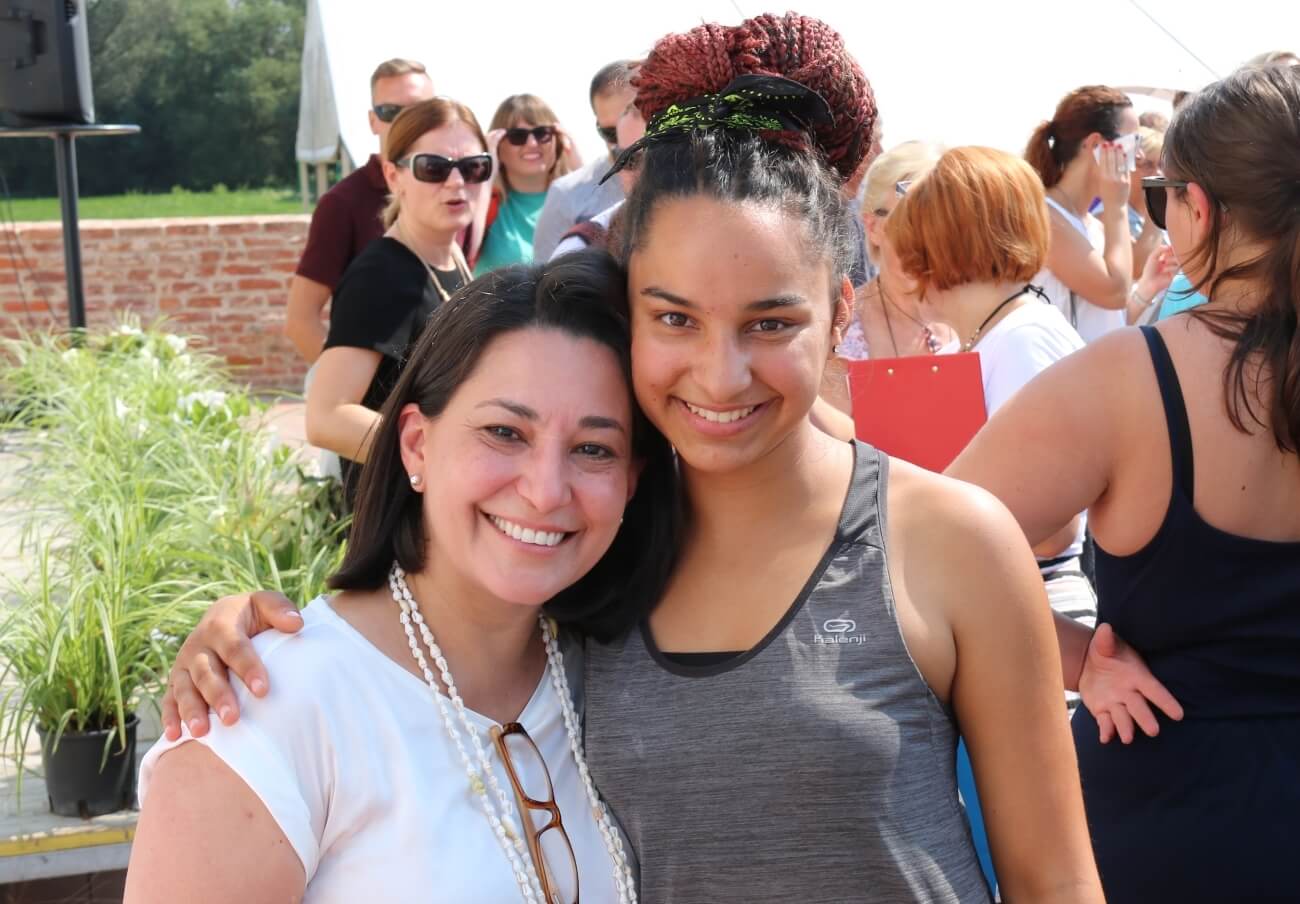
Regina M. Castillo on a foster family gathering © Marin Ilej/UNICEF
UNICEF Croatian Office is situated on Radnička cesta 41/7. To inform the public of their work, they built a considerable presence on Facebook, Twitter, Instagram, Youtube, and Linkedin. You can also find all UNICEF-related info for Croatia on their official website, and contact them via mail: This email address is being protected from spambots. You need JavaScript enabled to view it. or on phone numbers: +385 1 2442 660 and +385 1 2442 661. You can use the website to donate to a cause in Croatia too. Additionally, there are numbers: +385 1 4095 855, +385 99 2692 196, and +385 91 621 1039 for more details on donating to Croatia as well as e-mail address This email address is being protected from spambots. You need JavaScript enabled to view it.. You can also leave a donation to UNICEF in your will, and a phone number +385 1 3031 640 specializes for the issue in Croatia. If you find yourself in Croatia and you want to volunteer for UNICEF, more info can be found by sending a mail to This email address is being protected from spambots. You need JavaScript enabled to view it. and on phone number +385 1 3031 646.
And of course, you can donate for a good cause to UNICEF for any action the fund is internationally involved in.
To read more from the series "Friends of Croatia", follow TCN's dedicated page.
For more about UNICEF in Croatia, follow TCN's dedicated page.
Croatian President Zoran Milanović: "Serbia's Attempt to Equate Draža Mihailović With Tito Pathetic"
ZAGREB, 12 May, 2021 - Croatian President Zoran Milanović said on Tuesday that attempts to equate Serbian Chetnik leader Draža Mihailović with the anti-Fascist leader Josip Broz Tito were pathetic.
During World War II Draza Mihailovic led the Chetnik movement whose members were Nazi collaborators and were held responsible for mass-scale war atrocities against non-Serbs in Serbia, Bosnia and Herzegovina, Croatia, Montenegro and some other parts of the then Yugoslavia.
On Victory Day observed on 9 May, during a ceremony held in the National Theatre in Belgrade, two big pictures of Mihailović and Tito were displayed one by another on a video-wall, according to local media outlets. In attendance at that ceremony were Serbia's top officials including President Aleksandar Vučić.
This prompted the Croatian president to say today that Mihailović and Josip Broz Tito, who led the Partisan forces in that war, could not be equated.
"Mihailović was a mere fool. He was not the same as Ante Pavelić (the Fascist leader in Croatia during the Second World War), he was an opportunist and eventually war criminal," Milanović told the press in Zagreb.
As for Mihailović being posthumously decorated by U.S. President Harry Truman, Milanović said that the decoration had been awarded for the operation of rescuing 300 downed Allied airmen. "This is as if you were robbing a bank and then buying to someone a meat pie, pretending to have a big heart," said Milanović.
He went on to say that Chetniks were known for, atrocities, opportunism and cowardice and that they had faced the strongest resistance from Serbs, Montenegrins and Dalmatian Croatians.
He also accused Serbia's authorities of indoctrinating children and young people.
"Unfortunately, everything is delusion there in our neighbours," said Milanović, elaborating that a majority of the Croatians stayed at home during World War Two. "Being Home Guardsman (Domobran) is not at all a crime. It is o.k.," he said adding that a lot of fighters from the Croatian nation joined the Partisan troops, and only a small portion fought for the Axis powers and the (Pavelić-led) Ustasha movement.
For more about history in Croatia, follow TCN's dedicated page.
Highlights of the Week: 5 Big Events in Croatia from May 3-9, 2021
May 7, 2021 - TCN's regular retrospect of Highlights of the week, through the selection of TCN's reporter Ivor Kruljac.
President Milanović loved by locals in Plaški. Firefighters quickly reacted to the fire in Zagreb recycle yard. Pula celebrated its liberation while Šibenik received new doses of coronavirus vaccines. Dinamo and Hajduk end their match in a tie. Overall another interesting week in Croatia, and here are more details on all highlights.
Highlights of the week: President Milanović loved in Plaški county
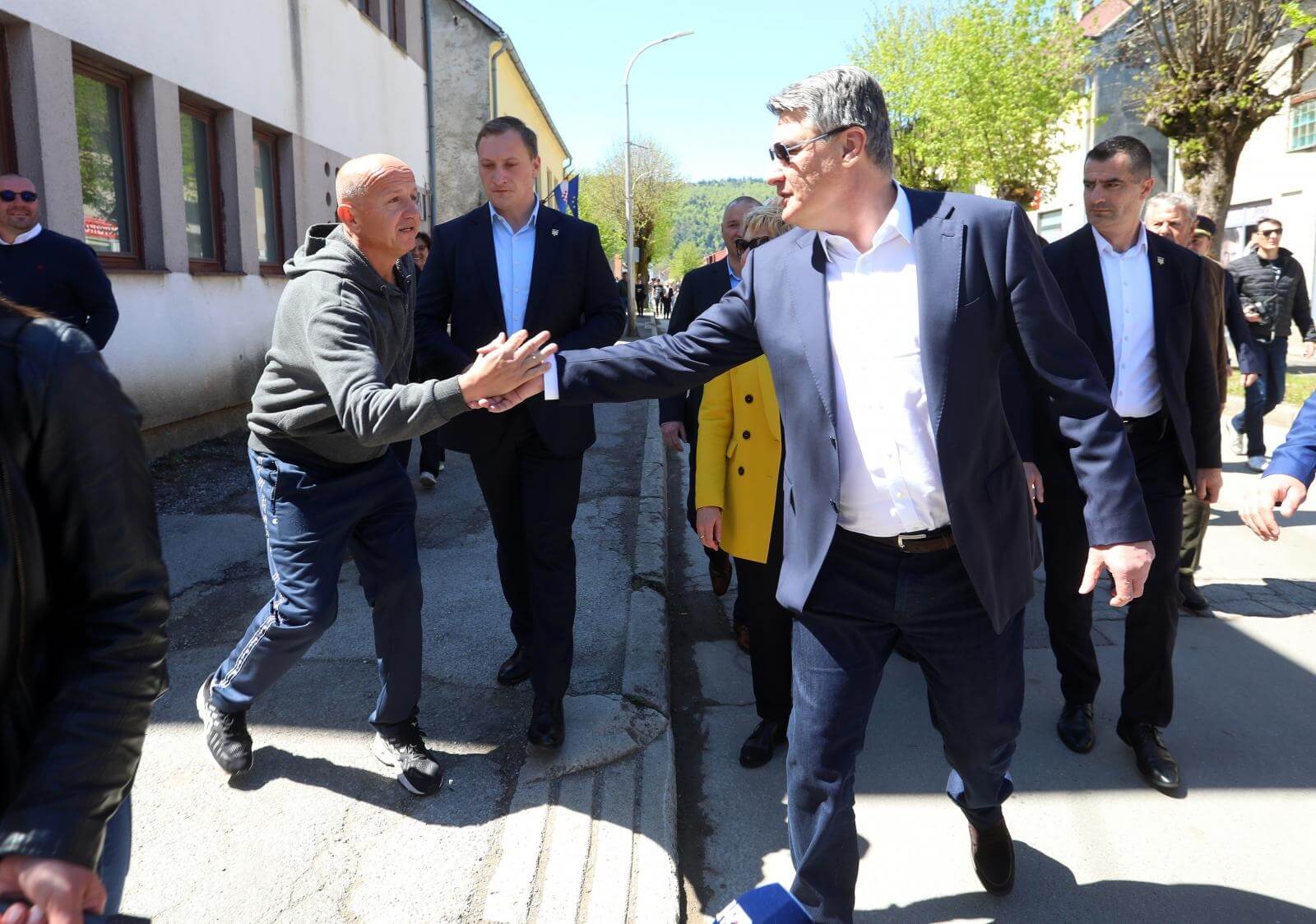
© Kristina Stedul Fabac/ PIXSELL
Croatian president Zoran Milanović visited Plaški county near Ogulin on Tuesday to visit the newly-build Firefighter's home and Plaški Culture Home. The locals welcomed president Milanović with ovations, and many use the opportunity to handshake and take a photo with the president. As Večernji List reports, Milanović took the visit as an opportunity to comment on the hate speech incident at Borovo Selo. He stated that the President of Serbian National Council Milorad Pupovac and Croatian Prime Minister „should use the police, but they don't, they are causing incidents.
Highlights of the Week: Pula celebrating its liberation in WW2
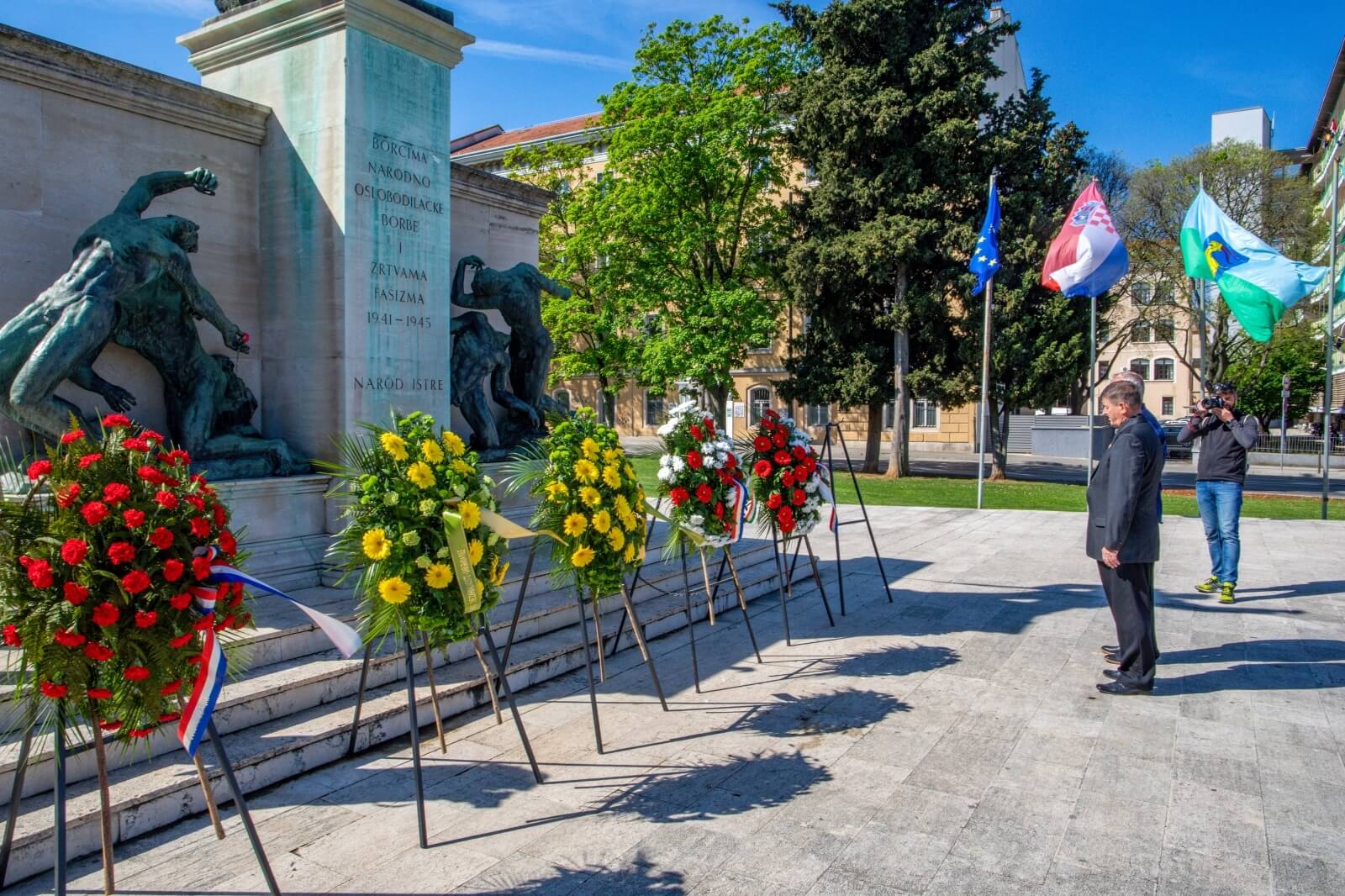
© Srecko Niketic/ PIXSELL
Pula celebrated its annual liberation day and the Pula City Day, marked on May 5. In Tito's park, the traditional commemoration to the fallen WW2 soldiers of Tito's partisan army saw Tiziano Sošić (president of Pula City Council), Elena Puh Belci (vice mayor of Pula), Aleksandar Matić (chief of the City of Pula Office) and Fabrizio Radin (vice-county ruler of Istria county) paid their respects. Representatives of associations of anti-fascist fighters and anti-fascist of the city of Pula were present too.
Highlights of the Week: Dinamo and Hajduk end with an even score 1:1
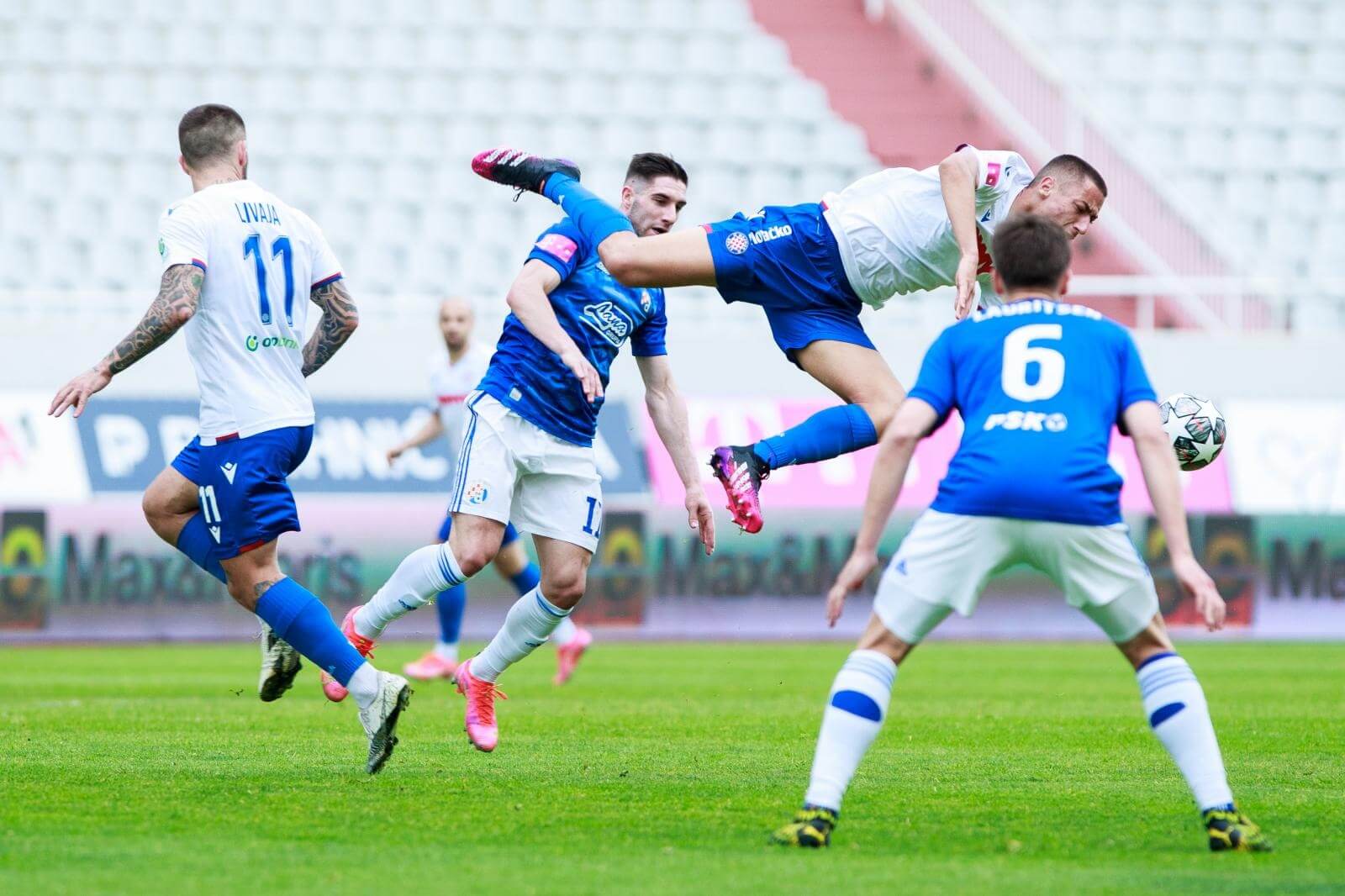
© Milan Sabic/ PIXSELL
Hajduk and Dinamo's eternal opponents played another game at Hajduk's home of Poljud Stadium in Split on Wednesday. The match was the 22nd round in Croatian First League, and fans couldn't wait for it as the game was postponed.
Hajduk opened the match well and had a chance to take the lead in the first 20 seconds. Kačaniklić received an excellent long ball and ran on the right side. He rushed into the penalty area and shot diagonally, but Livaković came out and closed his corner. Dinamo improved and took the lead in the 16th minute with a goal by Majer, and Livaja returned the favor in the 44th minute. Diamantakos hit the crossbar in the final minutes of the match but without success.
After three victories in the previous three clashes with Hajduk this season, Dinamo failed to achieve maximum performance and almost mathematically secured the title but entered the last four rounds with a seven-point advantage over Osijek. The fail happened despite Dinamo facing Hajduk with the strongest possible lineup.
Highlights of the Week: Vaccination in Šibenik continues successfully
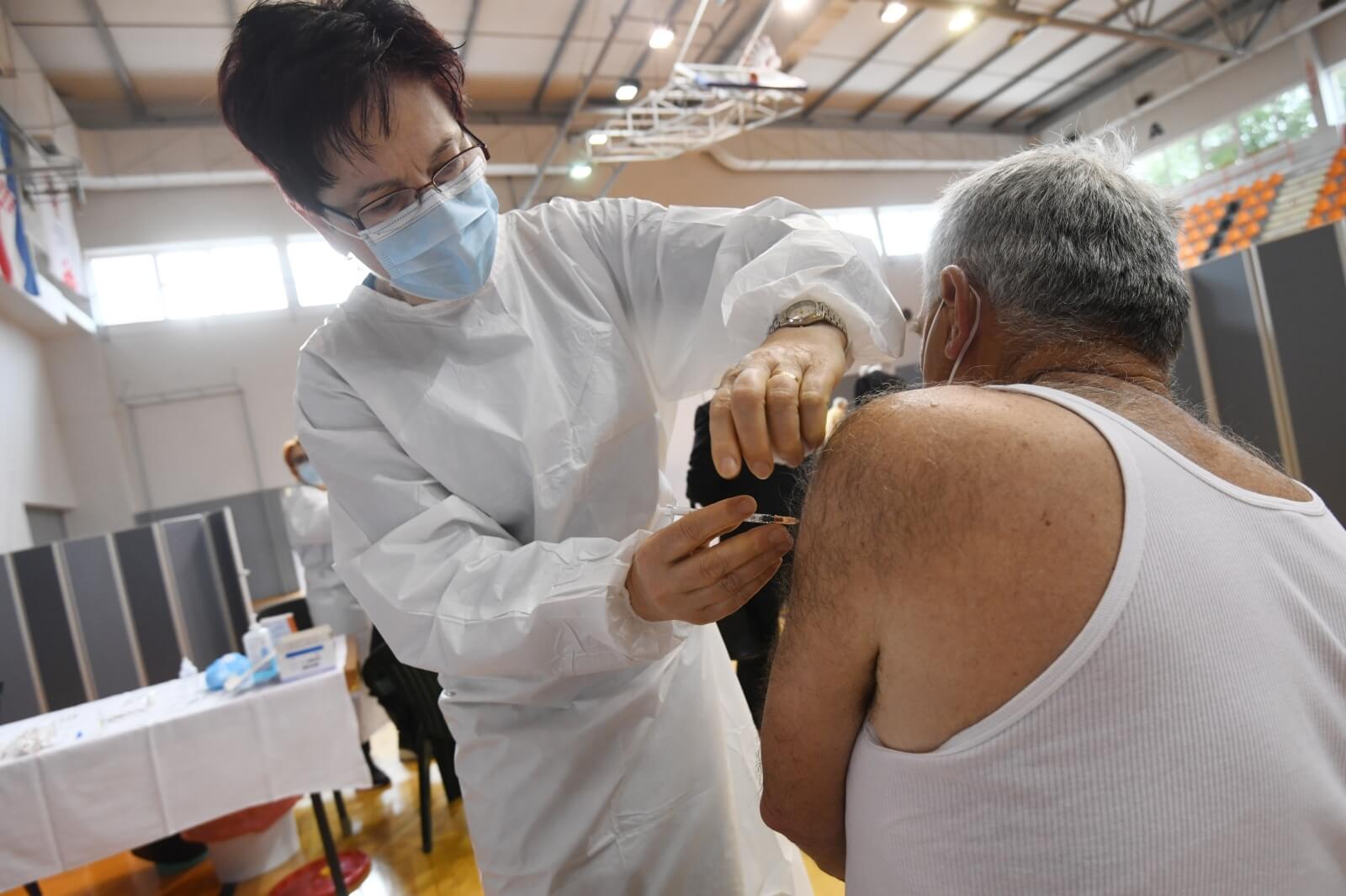
© Hrvoje Jelavic/ PIXSELL
Larger quantities of vaccines came to Šibenik on Friday, allowing vaccination in Baldeki Sports Hall to go without problems for the second day in the row. The vaccination attracts a number of citizens, so the area got quite crowded.
Highlights of the Week: Recycling yard in Zagreb on fire, reasons unclear
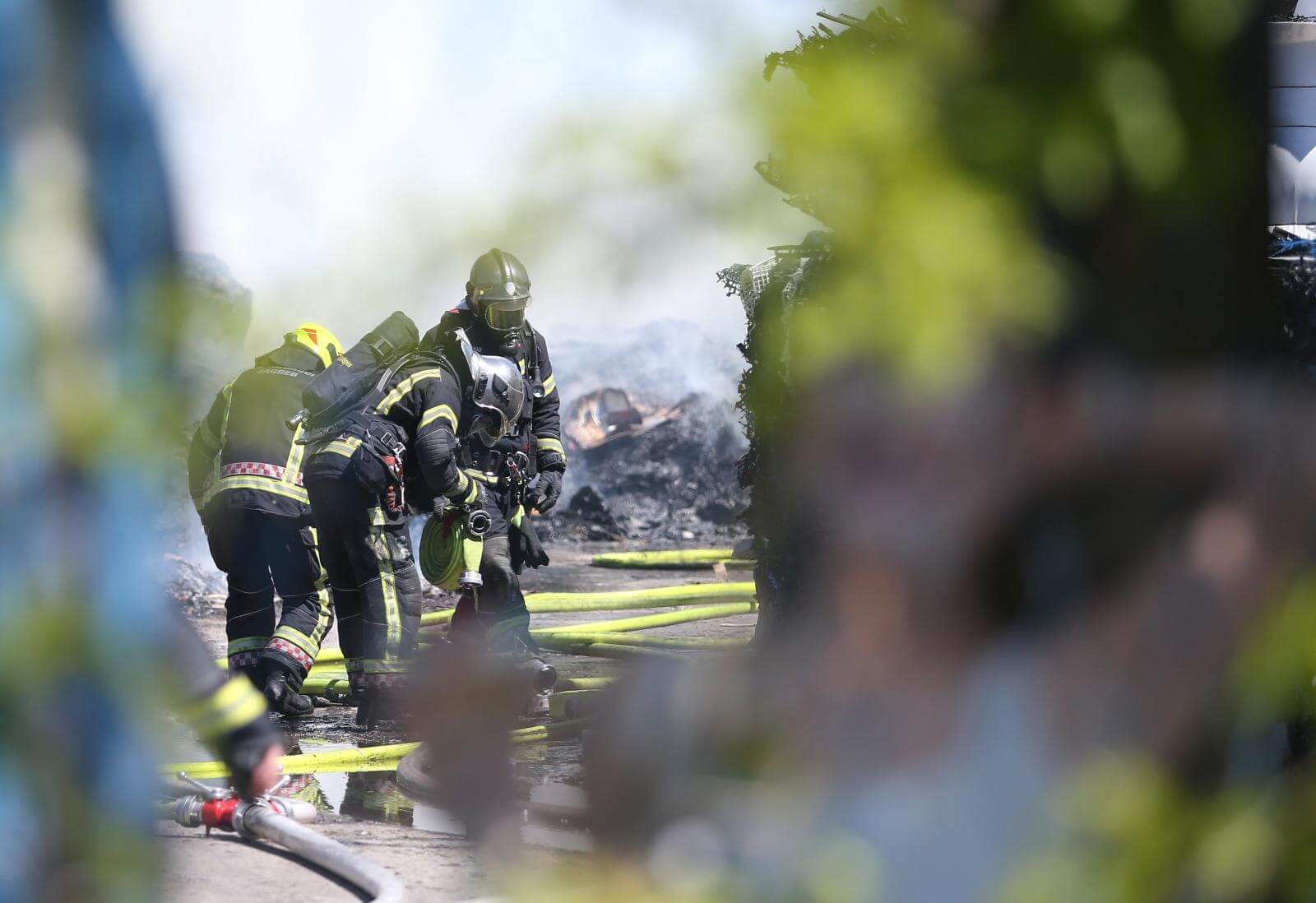
© Matija Habljak/ PIXSELL
Zagreb's recycling yard, located on Sarajevska Cesta in Novi Zagreb, was victimized by fire but quickly localized and put under control on Tuesday. The fire caught four containers, and 21 firefighters with six fire trucks rushed to the field. Police investigated the cause of the fire, but the reason is, for the moment, unknown. Firefighters managed to operate despite the lack of hydrants, and the thick white smoke was noticed by citizens who live in the buildings close to the yard, reported Večernji List.
To learn more about Croatia, have a look at our newly launched TC website.
For more about news in Croatia, follow TCN's dedicated page.
Israeli Ambassador Ilan Mor: "For the Homeland Ready" Can't Be Both Symbol of Heroism and Evil
ZAGREB, 23 April, 2021 - Israeli Ambassador Ilan Mor has said in an interview with Hina that the Ustasha salute 'For the homeland ready' cannot simultaneously be a symbol of heroism and a symbol of evil, and pointed out the good example set by Germany and Austria where the glorification of Nazism is punishable by law.
The issue of the said salute used by Ustasha, allies of the German Nazis in the Second World War, is raised every April, when Croatia observes anniversaries of the breakout of inmates from the Ustasha-run concentration camp in Jasenovac in late April in 1945. The 1941-1945 Jasenovac camp was a site of torture and mass executions of ethnic Serbs, Jews, Roma and of Croats who opposed Nazism and Fascism.
Since the 1991-1995 Homeland War, the controversial salute, whose abbreviation in Croatian is ZDS, has been permissible at commemorations of fallen defenders who used to be members of the HOS unit and who had that salute on their uniforms during that war of independence. On the other hand, for years, Jewish associations have continued requesting that the use of the salute should be outlawed, just as in the case of "Heil Hitler" salute, as its use carries a prison sentence in Germany and Austria.
"In Vukovar, the 'Za Dom Spremni' salute is considered to be part of heroism of the place, fighting against occupier and in Jasenovac 'Za Dom Spremni' is symbol of evil. So, you have to decide, it can't be the same symbol for totally different points in your history," says the ambassador after he yesterday participated in the commemorations on the occasion of the 76th anniversary of the breakout of inmates from the Jasenovac death camp.
Jewish rep expects legislative changes penalising Ustasha salute to be passed by summer
The head of the Coordinating Committee of the Jewish Communities of Croatia, Ognjen Kraus, said on Thursday there was a realistic possibility for the parliament to vote in amendments to the Penal Code to penalise the use of the Ustasha salute "For the homeland ready" before its summer recess.
"I believe that there will be no problems in voting the changes in if the Prime Minister and the HDZ mean what they say," Kraus said when asked about the possibility of outlawing the Ustasha salute, an initiative he launched earlier this year.
Commenting on this statement, Ambassador Mor says: "You have to do something about it. I am not a lawyer, i am not Croat and can't give you 'yes' or 'no' (on imposing a prison sentence for that salute). In this case, Germany and Austria are very good role model."
Ambassador warns of attempts to downplay the Holocaust
Commenting on some global trends of downplaying the tragedy of the Holocaust, Mor said that a portion of the Croatian society used every opportunity to glorify the Ustasha troops and Ustasha leader Ante Pavelić.
As if nothing had happened, as if Jasenovac had not been an extermination camp but a labour camp. This is in contradiction with historical facts and the testimonies by those who survived that period, the ambassador said.
Mor went on to say that historians in Croatia and Serbia disagreed about the numbers of Serb victims in Jasenovac, and he said that it was unacceptable to reduce such a tragedy to the issue of numbers.
"If you want to live in peace, you have to do more then producing movies, you have to have real dialogue," he said alluding also to the recent Serbian film ("Dara iz Jasenovca") about this topic which has been perceived in Croatia as well as internationally as part of the nationalistic propaganda of Serbia's authorities.
Mor urged both Croatia and Serbia to let their archives be available to experts and so that they can arrive at a point acceptable to both sides.
The same should be applied when it comes to Cardinal Alojzije Stepinac, he said and called for resorting to dialogue to overcome different views on the events in the past.
In this context he mentioned the normalisation of the relations between his country and several Arab countries. Following the 1979 peace agreement with Egypt and the 1994 peace agreement with Jordan, Israel has renewed relations with the United Arab Emirates, Bahrain, Sudan and Morocco in the past few months.
For more about politics in Croatia, follow TCN's dedicated page.
Parl. Speaker Gordan Jandroković For Sanctioning Ustasha Insignia and Regulating Communist Symbols
ZAGREB, 22 April, 2021 - Parliament Speaker Gordan Jandroković on Thursday condemned the crimes committed by the 1941-1945 Ustasha regime and called for legally sanctioning the use of the Ustasha insignia and also for regulating the treatment of Communist symbols, including the five-pointed Red Star.
"We must make a clear distinction between the insignia of the Ustasha regime and the heritage of the (1991-1995) Homeland War and regulate the treatment of symbols of the Communist regime," said Jandroković after he laid a wreath in Jasenovac on the occasion of the 76th anniversary of the breakout of inmates from the Ustasha-run concentration camp.
Jandroković called for consistency in regulating the treatment of the five-pointed Red Star which was displayed by people who committed horrendous atrocities in Bleiburg in the wake of the Second World War, on the Croatian island of Goli Otok during the Yugoslav Communist rule as well as in the Croatian towns of Vukovar and Škabrnja in 1991.
Jandroković said that he would like to see all those who participate in discussions about such insignia to be objective and to have understanding for the victims on all the sides.
"Croatia's history has been fraught with conflicts. Therefore, in all these years, no appropriate legislative solutions were found," he underscored, adding that Croatia's society is now mature enough to find, through democratic discussions, solutions that will protect each victim and deplore every criminal and totalitarian regime.
For more about politics in Croatia, follow TCN's dedicated page.
Croatia's Authorities Strongly Condemn NDH Crimes Against Roma
ZAGREB, 22 April, 2021 - Prime Minister Andrej Plenković on Thursday strongly condemned the atrocities committed against 17,000 ethnic Roma during the 1941-1945 Independent State of Croatia (NDH), while he paid a visit to the Roma Memorial Centre in Uštica, situated near Jasenovac.
This centre is in memory of nearly 17,000 Roma killed in the war and we condemn the crimes committed during the NDH regime, Plenković said after visiting the memorial complex.
Plenković and the government's delegation held a wreath-laying ceremony at the Uštica cemetery for Roma victims.
The Roma Memorial Center was built to permanently commemorate ethnic Roma members killed in the genocide committed by the Nazi and Ustasha regimes during World War II.
Plenković recalled that this memorial complex was unique in Europe, and that the construction of the centre had cost eight million kuna, and that the Croatian government had covered nearly 90% of those costs.
According to the Croatian premier, in this way, a contribution was made to efforts to enable dignified marking of the suffering of ethnic Roma in Croatia and to build a memorial centre where all others can come to pay tribute to war victims.
The parliamentary deputy of ethnic Roma, Veljko Kajtazi, said that constructing this memorial centre was the least one could do for killed Roma.
He also called on Roma from other parts of Europe and the world to visit this centre and thus pay tribute to war victims.
The Uštica memorial centre was officially opened last August, and its formal opening coincided with the occasion of Roma Holocaust Memorial Day, or the Samudaripen, observed on August 2.
This memorial complex is set up in Uštica, located about 110km southeast of Zagreb, which used to be the site of mass executions of Roma who were deported to the Jasenovac concentration camp during the Second World War. The Memorial Centre includes a cemetery with 21 mass graves.
For more about politics in Croatia, follow TCN's dedicated page.


